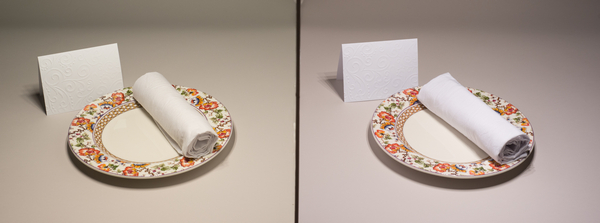Soraa, the world leader in GaN on GaN™ LED technology, announced today new psychophysical research proving that whiteness and color rendering have a strong effect on the perception of energy-efficient LED lighting. The study was approved by an Institutional Review Board and led by Kevin Houser at Penn State University.
Compared with conventional blue-based LEDs, study participants overwhelmingly preferred the whiteness and color rendering of Soraa’s full visible spectrum lamps with Violet-Emission 3-Phosphor (VP3) technology. Like conventional electric light sources such as incandescent and halogen lamps, Soraa’s lamps emit full visible spectrum light which renders warm, saturated colors—including important colors like reds and bright greens. Furthermore, these lamps excite Optical Brightening Agents (OBAs) in white objects like clothing, paper and plastics, making them look intentionally whiter. However, in their race to create maximally efficient, cheap products, most LED manufacturers skipped parts of the spectrum. This has resulted in blue-LED based lighting products that cannot truly render whiteness or colors.
 |
|
Because all of Soraa's lamps render the entire visible spectrum, white fabrics and paper goods pop, plastics are brilliant and people's smiles are whiter, and colors are more natural and beautiful.(Soraa/LEDinside) |
Uniquely, Soraa’s full visible spectrum lamps with VP3 Natural White are engineered to emit all colors of the rainbow, including violet, which excites OBAs and perfectly renders whites. The research study at Penn State showed that the vast majority of participants preferred objects rendered under Soraa’s full visible spectrum light over standard LED light that lacked the short wavelength range of the spectrum. In fact, whether looking at a white dress shirt or their own smile, 90% of users preferred the whiteness rendering provided by Soraa’s lamps.
As for colors, study participants commented that colors were more saturated, vibrant and attractive under Soraa’s full visible spectrum LED lamps with VP3 Vivid Color (color rendering index (CRI) of 95 and R9 of 95) versus the blue-based LED lamps with a standard CRI of 85 and R9 of 0. The research showed that the company’s VP3 technology rendered colors with high fidelity and no change in saturation; and the colors accurately matched the reference halogen lamp. This was true not only for colored objects, but also for participants’ skin complexions.
 |
|
While most LEDs just illuminate, Soraa's full visible spectrum lamps make colors and whites pop.(Soraa/LEDinside) |
“There are those who’ve asked: does color and whiteness rendering really matter? Well, it does, and we now have the data to prove it,” said Mike Krames, CTO of Soraa. “Because all of our lamps render the entire visible spectrum, white fabrics and paper goods pop, plastics are brilliant and people’s smiles are whiter, and colors are more natural and beautiful. That’s good news for consumers and retailers, who want and deserve the enormous economic and environmental benefits of LED lighting, but are unwilling to sacrifice the sales benefits of excellent light quality in return.”
To access the full journal paper, visit: http://lrt.sagepub.com/content/early/2014/08/22/1477153514548089.abstract.
For more information on VP3 Natural White and VP3 Vivid Color technologies used in Soraa’s full visible spectrum MR16, PAR and AR111 LED lamps, please visit: www.soraa.com.













